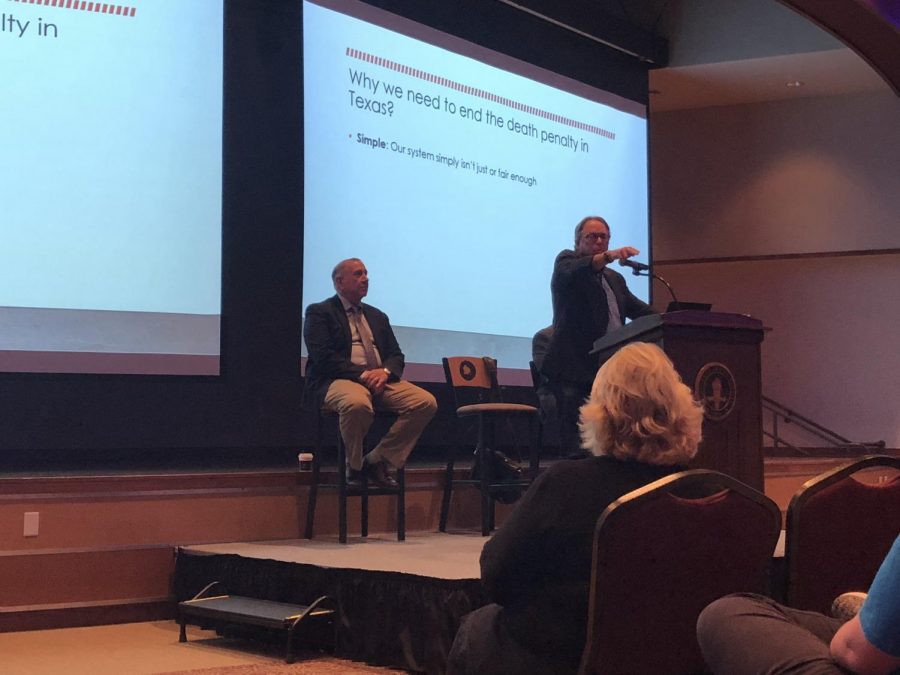WTAMU discusses the death penalty
Jeff Blackburn defending his argument to end the death penalty.
October 26, 2018
The Criminal Justice department hosted a debate showcasing the pros and cons of the death penalty at 6:30 p.m. Tuesday, Sept. 11 in the Jack B. Kelley Legacy Hall.
James Farren represented support for capital punishment. Jeff Blackburn was in opposition and Keith Price was neutral by saying the government needed to provide more reform to the death penalty. Each had 15 minutes to defend their case. This was followed by a public forum discussion.
Farren is a criminal justice instructor as well as a Randall county district attorney. He is in support of the death penalty and believes the effects it has in the criminal justice system are beneficial.
“There’s some people you can’t fix,” Farren said. “What are you gonna do with Jeffrey Dahmer and Ted Bundy? You can’t fix them.”
The debate about the death penalty is common among many. Farren explained he has had this debate with many different people many times, but will still have their opinions about the death penalty.
“You show me your experts, I’ll show you mine,” Farren said. “ [But] everyone will go home believing the same thing as when they arrived.”
Jeff Blackburn is a defense attorney and a founder of the Innocence Project. Blackburn defended his argument against capital punishment in Texas.
“Do we as a government deserve to kill people?” Blackburn said.
The non-profit organization, Innocence Project, helps people who have been wrongly convicted of crimes they did not commit and assists in getting those convictions overturned.
Blackburn explained the purpose of the organization is to help low-income citizens who would not otherwise have the option of good representation. Blackburn’s main claim throughout the debate was the fact that the judicial system is not fair enough to effectively have the death penalty.
“Our system just isn’t good enough to justify killing people,” Blackburn said. “We don’t have a fair enough system in Texas to justify killing people.”
Blackburn said the death penalty is not a moral punishment or an emotional win, but a legal penalty.
“We’re a long way from having a perfect system,” Blackburn said.
Blackburn went on to say the current system is politicized and needed to be reformed in order to be effective. Agreeing with Blackburn was Price, criminal justice professor and retired warden. Price was neither for nor against the death penalty. Price was for reforming what is in place so far.
“There’s no fool-proof system,” Price said. “A real threat to the death penalty is equal protection under the law”. You can learn how to get the right kind of lawyer to represent your case.
Price explained alternatives to the death penalty and experimental protocol towards capital punishment. Price went on to ask if there were crimes that were so terrible, the only retribution would be the death penalty.
“There’s some events that the only appropriate retribution is to forfeit their life,” Price said.
Price also argued that an alternative to capital punishment would be incapacitation. This is when you take someone dangerous and seclude them in order to make them less of a threat.
Price claimed murder rates have been shown to be the same with or without capital punishment being an option.
According to the Texas Department of Criminal Justice, there have been eight executions in 2018 with the most recent being on July 17. The average waiting time on death row prior to execution is 10.87 years.
According to the Texas Department of Criminal Justice, since its reinstatement in 1976, Texas leads the United States in number of executions. Texas, California, Florida and Pennsylvania have the highest death row populations in the nation.
Farren ended his argument by showing the victims and their families to the public. In particular, he showed the victims of Kenneth Allan McDuff, a death row inmate who was paroled during his life sentence. McDuff then raped and murdered a group of women just 3 days after he was paroled.
“These [victims of murder] are not just names on a piece of paper, these are living breathing human beings.”




